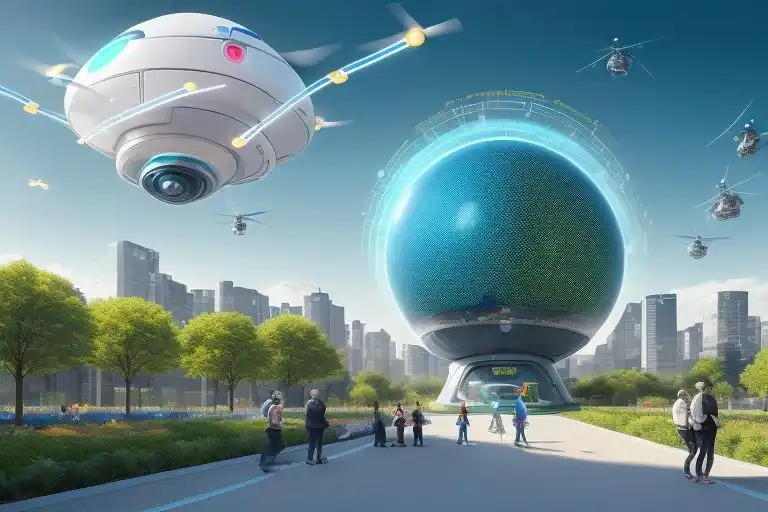
Artificial Intelligence: Transforming Society, Today
Artificial Intelligence (AI) is no longer a speculative concept relegated to the distant future or the plots of science fiction. It is a tangible reality deeply embedded in the fabric of modern society, fundamentally altering the way we live, work, interact, and even think. The pace of its development is accelerating, bringing forth transformations across industries that were scarcely imaginable just a decade ago. From the sophisticated algorithms powering self-driving vehicles to groundbreaking applications in personalized healthcare and the seamless experiences driven by recommendation engines, AI is not just changing the way we do things – it is redefining the art of the possible.
The profound impact of AI necessitates a thorough understanding of its multifaceted influence. In this article, we will delve into the significant effects AI is having on modern society, meticulously examining both the compelling benefits it offers and the critical challenges it presents across various sectors.
To provide a comprehensive and insightful exploration of this rapidly evolving field, we have conducted extensive research. This includes reviewing the latest academic studies, exploring industry reports, and engaging in discussions with leading experts and innovators at the forefront of AI development.
As noted by futurists like Ray Kurzweil, the progress of AI is rapid and holds implications reaching far beyond current capabilities:
Quotation: “Artificial intelligence will reach human levels by around 2029. Follow that out another 30 years and we will be able to do a brain upload.” – Ray Kurzweil, American inventor and futurist
While Kurzweil’s vision points towards a more distant potential, the immediate benefits of AI are already being widely felt.
The Benefits of AI: Driving Progress and Innovation
AI’s integration into various systems and processes is yielding remarkable advantages, boosting efficiency, personalizing experiences, and enhancing safety and accuracy.
- Efficiency and Productivity: One of the most immediate impacts of AI is its ability to automate routine, repetitive, and time-consuming tasks. By taking over these processes – whether in data entry, customer service chatbots, or complex manufacturing operations – AI frees up human workers to concentrate on more creative, strategic, and complex problem-solving activities. This reallocation of effort leads to significant increases in overall efficiency and productivity across industries, streamlining operations and reducing operational costs.
- Personalization: Leveraging its capacity to analyze vast datasets swiftly, AI enables unprecedented levels of personalization. This is evident in tailored product recommendations on e-commerce sites, highly customized content feeds on social media, adaptive learning platforms in education, and personalized treatment plans in healthcare. By understanding individual preferences, behaviors, and needs, AI can deliver highly relevant and engaging experiences that were previously impossible on a large scale.
- Accuracy and Precision: AI systems, when properly trained and implemented, can perform tasks with a level of accuracy and precision that often surpasses human capabilities, particularly in tasks requiring the analysis of complex patterns or large volumes of data. This is crucial in fields like medical diagnostics, where AI algorithms can detect subtle anomalies in images (like X-rays or MRIs) with high accuracy, reducing the potential for human error and leading to earlier or more precise diagnoses. Similarly, in finance, AI can analyze market trends and detect fraudulent activities with greater precision.
- Safety: AI contributes significantly to improving safety in various demanding environments. By automating tasks in hazardous settings (like deep-sea exploration or mining) or by enhancing predictive capabilities (like identifying potential equipment failures before they occur), AI minimizes risks to human life. The most widely discussed example is autonomous driving, where the elimination of human error – a major cause of accidents – holds the potential to dramatically improve road safety, although significant challenges remain in this area.
The Challenges of AI: Navigating the Complexities
Despite the immense potential and tangible benefits, the widespread adoption of AI also brings forth significant challenges that require careful consideration, ethical frameworks, and forward-thinking policy.
- Job Displacement: As AI becomes more capable of automating tasks previously performed by humans, there is a legitimate concern about potential job displacement. Routine manual and cognitive jobs are most vulnerable. While AI will undoubtedly create new jobs related to its development, maintenance, and oversight, the transition may be difficult for workers in affected sectors, potentially exacerbating economic inequality if not managed proactively through education, retraining, and social support systems.
- Bias: A critical challenge lies in the potential for AI systems to inherit, perpetuate, and even amplify existing societal biases present in the data they are trained on. If training data reflects historical discrimination (e.g., in hiring patterns, loan applications, or criminal justice), the AI system will learn and replicate these biases, leading to unfair or discriminatory outcomes even if the algorithm itself is not intentionally biased. Addressing AI bias requires careful data curation, algorithm design, and ongoing monitoring.
- Security: AI systems, like any complex software, are vulnerable to cyber threats. This risk is compounded by the potentially critical functions AI performs. Adversarial attacks, where malicious actors manipulate data to confuse or trick an AI system (e.g., causing a self-driving car to misinterpret a stop sign) or data breaches compromising the vast amounts of sensitive information AI systems process, pose serious risks to individuals, businesses, and national security.
- Ethics: The deployment of AI raises profound ethical questions. Issues include the potential for mass surveillance and erosion of privacy through pervasive monitoring technologies, questions of accountability when an autonomous system makes a decision with negative consequences, and the potential for AI to be used in autonomous weapons systems. Ensuring AI development and deployment align with human values and societal well-being is a complex and ongoing debate.


